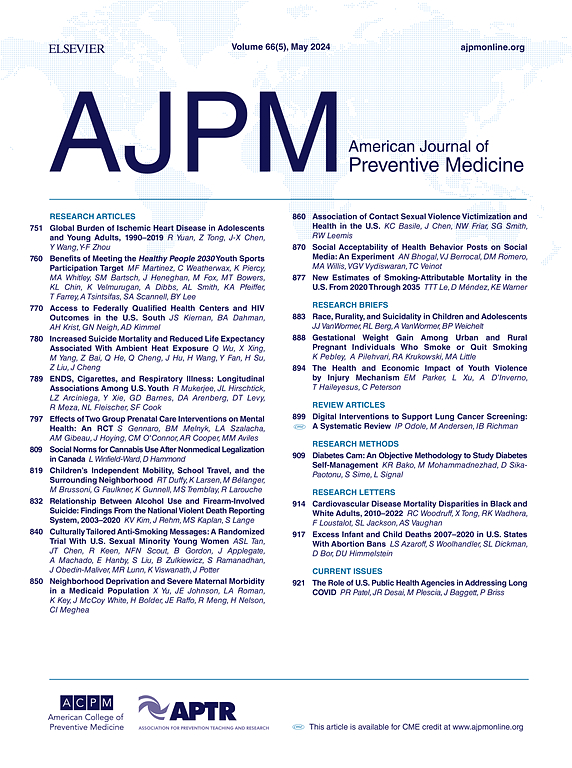Adverse Childhood Experiences Module Nonresponse: Behavioral Risk Factor Surveillance System, 2019 and 2021
IF 4.3
2区 医学
Q1 MEDICINE, GENERAL & INTERNAL
引用次数: 0
Abstract
Introduction
Data on adverse childhood experiences are key to understanding their burden and informing prevention programs and strategies. Population-based surveys that collect adverse childhood experiences data may be affected by item nonresponse. This study examines differences in nonresponse to the optional Behavioral Risk Factor Surveillance System adverse childhood experiences module overall, by sociodemographic characteristics, by year, and by question.
Methods
This study used Behavioral Risk Factor Surveillance System adverse childhood experiences module data from 21 states in 2019 and 16 states in 2021. Weighted proportions and 95% CIs of responders and nonresponders to the adverse childhood experiences module by year and sociodemographic characteristics and percentages of nonresponders for each question were calculated. Chi-square tests were used to assess statistically significant (p<0.05) differences. Analyses were conducted in 2023.
Results
In 2019 and 2021, 1.2% (95% CI=1.1, 1.4) and 2.4% (95% CI=2.2, 2.5) of Behavioral Risk Factor Surveillance System participants were nonresponders to the adverse childhood experiences module, respectively (p<0.01). Nonresponders were more likely to be non-Hispanic Black (p=0.01) or non-Hispanic Asian (p=0.01), to be unemployed (p<0.01), to have income <$15,000 (p<0.01), or to report poor health (p<0.01) than responders. Nonresponse by question increased as the module progressed, and nonresponse was highest for sexual abuse questions.
Conclusions
Overall, findings demonstrate that individuals are willing to respond to the adverse childhood experiences module questions. Although low, nonresponse to the module increased from 2019 to 2021. Higher nonresponse for sexual abuse questions may be due to their sensitivity or potential survey fatigue due to placement at the end of the module. Higher nonresponse among racial/ethnic minorities and economically disadvantages groups highlights opportunities to improve existing surveillance systems.
童年不良经历模块无响应:行为危险因素监测系统,2019 年和 2021 年。
导言:有关童年不良经历 (ACE) 的数据是了解其负担并为预防计划和策略提供信息的关键。收集 ACEs 数据的基于人口的调查可能会受到项目无响应的影响。本研究按照社会人口学特征、年份和问题的不同,对行为危险因素监测系统(BRFSS)ACEs 模块的非响应性差异进行了研究:该研究使用了 2019 年 21 个州和 2021 年 16 个州的 BRFSS ACEs 模块数据。计算了按年份和社会人口特征划分的 ACEs 模块应答者和未应答者的加权比例和 95% 置信区间 (95%CI),以及每个问题的未应答者百分比。采用卡方检验来评估统计学意义(pResults:在 2019 年和 2021 年,分别有 1.2% (95% CI=1.1, 1.4)和 2.4% (95% CI=2.2, 2.5)的 BRFSS 参与者未对 ACEs 模块作出回复(p结论:总体而言,研究结果表明个人愿意回答 ACEs 模块的问题。从 2019 年到 2021 年,未回答该模块问题的人数虽然不多,但却有所增加。性虐待问题的未回复率较高,可能是由于其敏感性,也可能是由于将其置于模块末尾而导致的潜在调查疲劳。少数种族/族裔和经济弱势群体的未回复率较高,这凸显了改进现有监测系统的机会。
本文章由计算机程序翻译,如有差异,请以英文原文为准。
求助全文
约1分钟内获得全文
求助全文
来源期刊

American Journal of Preventive Medicine
医学-公共卫生、环境卫生与职业卫生
CiteScore
8.60
自引率
1.80%
发文量
395
审稿时长
32 days
期刊介绍:
The American Journal of Preventive Medicine is the official journal of the American College of Preventive Medicine and the Association for Prevention Teaching and Research. It publishes articles in the areas of prevention research, teaching, practice and policy. Original research is published on interventions aimed at the prevention of chronic and acute disease and the promotion of individual and community health.
Of particular emphasis are papers that address the primary and secondary prevention of important clinical, behavioral and public health issues such as injury and violence, infectious disease, women''s health, smoking, sedentary behaviors and physical activity, nutrition, diabetes, obesity, and substance use disorders. Papers also address educational initiatives aimed at improving the ability of health professionals to provide effective clinical prevention and public health services. Papers on health services research pertinent to prevention and public health are also published. The journal also publishes official policy statements from the two co-sponsoring organizations, review articles, media reviews, and editorials. Finally, the journal periodically publishes supplements and special theme issues devoted to areas of current interest to the prevention community.
 求助内容:
求助内容: 应助结果提醒方式:
应助结果提醒方式:


